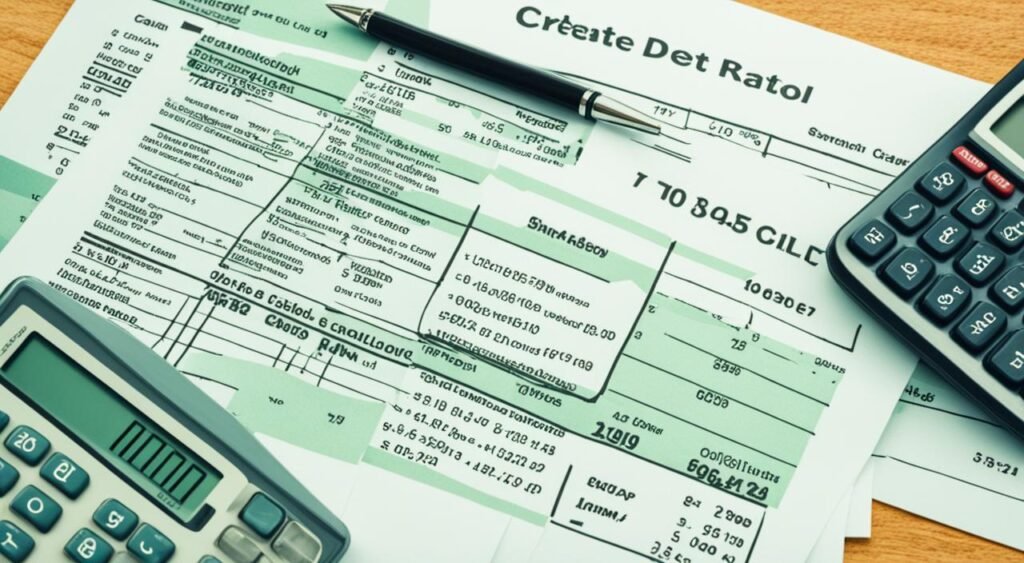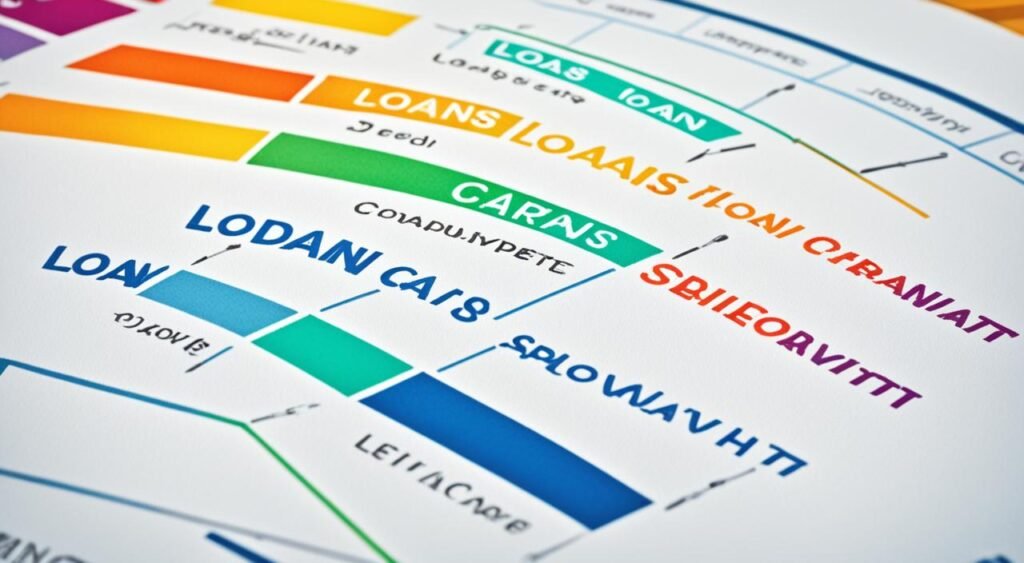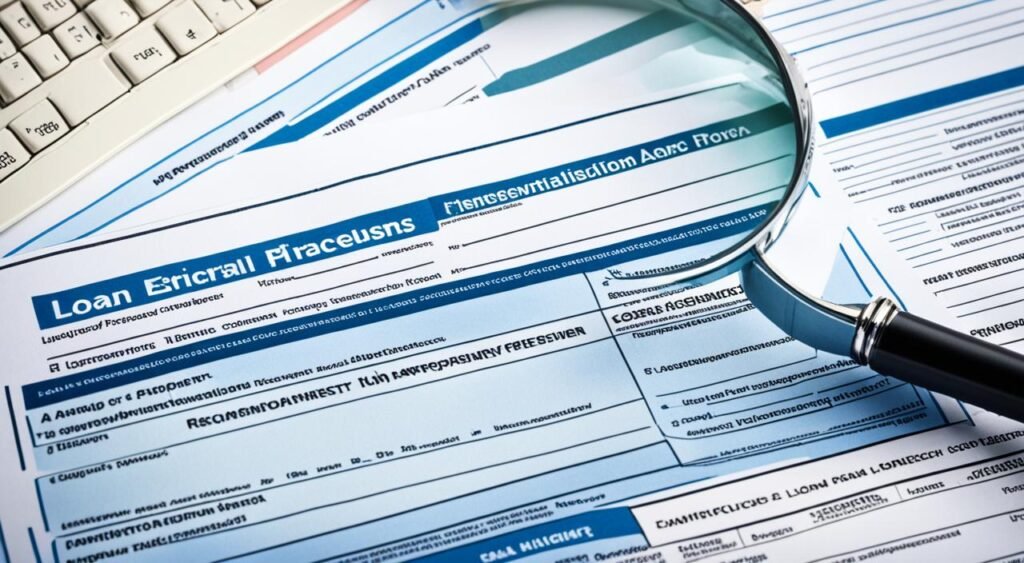Getting a loan? Your credit score and history matter, but they’re not all lenders look at. They check many things to see if they should approve your loan and what terms to offer. Knowing what they look for can boost your chances of getting your loan approved.
Key Takeaways
- Lenders check your credit score, history, income, job, debt-to-income ratio, and collateral for loan approval.
- Putting down a big payment and having enough cash and assets can help get your loan approved.
- Loan requirements change by lender and type, so know what your loan needs.
- Being open and giving all needed documents makes the loan process smoother.
- Getting your finances ready and knowing what lenders look for can help you get the loan you need.
Understanding the Loan Approval Process
Getting a loan, like a personal loan, mortgage, or business loan, means going through a detailed process. Lenders check many things to see if you can pay back the loan. This is key to making sure you’re a good candidate for the loan.
Importance of Loan Approval Factors
Lenders look at several things when they review a loan application. They check your credit score, credit history, income, and employment history. They also look at your debt-to-income ratio, collateral value, down payment size, and liquid assets. These details help them understand your financial situation and decide on the loan terms.
Types of Loans: Personal, Mortgage, Business
Even though the main factors are the same for all loans, lenders might focus on different things for each type. For personal loans, they often look at your credit score and debt-to-income ratio. Mortgages might care more about the collateral value (the property) and the down payment size. Business loans might look at your business history, cash flow, and industry-specific factors more closely.
Knowing what lenders want can help you prepare a strong loan application. This can boost your chances of getting the loan you need.
“Being honest and transparent with the lender throughout the application process is crucial for a successful loan approval.”
Your Credit Score and Credit History

When you apply for a loan, your credit score and credit history are key. Lenders look at these to see if you’re a good borrower. They want to know if you’re likely to pay back the loan.
Your credit score shows how good you are with credit. It’s based on the FICO and VantageScore models. Scores go from 300 to 850. A higher score means you’re seen as a lower risk and more likely to get the loan.
Lenders check your credit report too. This comes from big credit bureaus. It lists your credit history, like how you’ve paid bills and any credit mistakes. It’s important to check your credit report for mistakes. These can hurt your credit score and loan chances.
- Keep an eye on your credit score and credit report for problems.
- Improve your credit history by paying on time, lowering debt, and avoiding too many credit checks.
- Fix any mistakes in your credit report before applying for a loan.
“Having a good credit score and credit history helps you get better loan terms and get approved faster.”
Income and Employment History

Lenders focus a lot on an applicant’s income and job history when approving loans. They want to make sure the borrower has a steady income to pay back the loan. This includes full-time, part-time, or self-employment.
Demonstrating Stable Income
Lenders look for steady income from a job, part-time jobs, or a reliable self-employment. Showing a history of consistent earnings makes an applicant more appealing. It shows the borrower can handle their debt over the loan’s life.
Self-Employment Considerations
Self-employed people face a tougher review of their income. Lenders check tax returns to see if the income meets their standards. Self-employed borrowers might need to provide more documents, like profit and loss statements or business licenses, to prove their income’s stability.
| Income Source | Considerations for Lenders |
|---|---|
| Full-Time Employment | Lenders look for a consistent employment history, often requiring at least two years in the same or a similar role. |
| Part-Time Employment | Lenders may consider part-time income, but it may be subject to additional scrutiny and may not carry the same weight as full-time employment. |
| Self-Employment | Self-employed applicants may need to provide more detailed financial documentation, such as tax returns and business licenses, to demonstrate the stability and reliability of their income. |
Showing a steady income, through full-time, part-time, or self-employment, can boost an applicant’s loan approval chances. It helps secure the needed financing.
Debt-to-Income Ratio

When you apply for a loan, lenders look closely at your debt-to-income (DTI) ratio. This ratio compares your monthly debt payments to your monthly income. It shows lenders if you can handle loan payments.
Calculating Your Debt-to-Income Ratio
To find your DTI ratio, add up all your monthly debts. This includes your mortgage or rent, credit card balances, student loans, auto loans, and other debts. Then, divide this total by your monthly gross income.
The result is your DTI ratio. Lenders usually want this to be under 43% for loan approval.
| Debt Type | Monthly Payment |
|---|---|
| Mortgage/Rent | $1,500 |
| Credit Card Balances | $300 |
| Student Loans | $250 |
| Auto Loan | $350 |
| Total Monthly Debt | $2,400 |
If your monthly income is $5,500, your DTI ratio would be 43.6%. This might affect your loan approval chances. Lowering your debt and increasing your income can help improve your DTI ratio.
Keeping a good debt-to-income ratio is key for loan approval and financial stability. Manage your debt and increase your income to show you’re a responsible borrower. This can boost your chances of getting the financing you need.
Value of Collateral

Securing a loan often depends on the collateral’s value. Things like a home or vehicle help the lender get back their money if you can’t pay. They look at the current asset value to set the right loan amount and interest rates.
For secured loans, having high-value collateral means better loan terms. This is because lenders see you as less of a risk. But, unsecured loans don’t need collateral. They might have higher interest rates because they’re riskier.
Lenders use the loan-to-value ratio to check how much they can lend against your collateral. A lower ratio means stronger collateral, which can lead to easier loan approval and better interest rates.
| Collateral Type | Average Value | Loan-to-Value Ratio |
|---|---|---|
| Primary Residence | $300,000 | 80% |
| Luxury Vehicle | $50,000 | 70% |
| Small Business Assets | $100,000 | 60% |
Knowing how collateral affects loan approval helps borrowers make better choices. This can boost their chances of getting the financing they need.
Size of Down Payment
The size of your down payment greatly affects your loan approval chances, especially for mortgages. Lenders like a down payment of at least 20% of the home’s value for conventional loans. This makes the loan-to-value ratio lower and reduces the lender’s risk.
Conventional and FHA Loan Requirements
But, some loans like FHA loans allow for smaller down payments, around 3.5% of the home’s value. In these cases, you might need to pay for private mortgage insurance. This can make your monthly payments higher. The down payment size is crucial for lenders when they review your loan application.
- Conventional loans usually require a 20% down payment to avoid private mortgage insurance (PMI)
- FHA loans allow for a down payment as low as 3.5% of the home’s value, but PMI is required
- The larger the down payment, the lower the loan-to-value ratio, which can improve your chances of loan approval
- Private Mortgage Insurance (PMI)
| Loan Type | Typical Down Payment | |
|---|---|---|
| Conventional Loan | 20% of home value | Not required with 20% down payment |
| FHA Loan | 3.5% of home value | Required regardless of down payment |
The size of your down payment is key in the loan approval process. Knowing the requirements for different loans can help you make a smart choice. This can boost your chances of getting the financing you need.
Liquid Assets and Cash Reserves

Lenders look closely at an applicant’s liquid assets and cash reserves when they review loan applications. These assets show the applicant’s financial health and ability to keep up with loan payments during tough times, like job loss or income drops.
Having a lot of liquid assets, like savings, money market accounts, and emergency funds, makes a borrower seem less risky. This can lead to better loan terms and lower interest rates. Lenders trust these applicants more because they seem financially stable.
Lenders check an applicant’s financial situation, including their liquid assets and cash reserves, when deciding on loans. Showing you can handle financial challenges makes you more likely to get the loan you need.
| Liquid Asset Type | Description |
|---|---|
| Savings Accounts | Easily accessible funds that earn interest |
| Money Market Accounts | Accounts that offer higher interest rates than traditional savings |
| Emergency Funds | Dedicated savings set aside for unexpected expenses |
Keeping a good balance of liquid assets and cash reserves helps applicants get loans approved and get better terms. This shows they are good at managing money and can pay back the loan.
“Having a strong emergency fund and liquid savings can be the difference between getting your loan approved or denied.”
loan approval

When you apply for a loan, the repayment period is key. Lenders like loans with shorter terms because they think the borrower’s finances won’t change much. Short loan terms mean lower interest charges, but you’ll pay more each month.
Longer loan terms make monthly payments easier to handle. But, you’ll pay more in total interest over time. Lenders look at your financial circumstances to pick the right loan term.
Short-Term vs. Long-Term Loans: Weighing the Pros and Cons
Lenders weigh the pros and cons of short-term loans and long-term loans when approving loans. Short-term loans, from 1 to 5 years, have lower interest charges but higher monthly payments. Long-term loans, 10 to 30 years, have lower monthly payments but you’ll pay more in total interest.
The best loan term depends on your financial situation and needs. Lenders check your risk assessment and loan eligibility to find the best loan term. This balances cost and loan repayment ease.
“The length of the loan term can significantly impact the overall cost and affordability of a loan. Careful consideration of short-term versus long-term options is crucial for making an informed decision.”
Types of Loans and Eligibility Requirements

Exploring the world of loans can feel overwhelming. But knowing about the different types and what you need to qualify is key. Lenders offer personal loans, mortgages, and business loans, each with its own rules for getting approved.
Personal loans are often easier to get if you have a less-than-perfect credit history. Mortgages are stricter, looking closely at your credit score, debt-to-income ratio, and if you can make a down payment.
Some loans, like FHA loans and conventional loans, have special rules. FHA loans might need a smaller down payment but come with extra fees and insurance. Conventional loans usually want a higher credit score and a bigger down payment. But they can offer better interest rates and terms.
Before picking a loan, it’s important to check the eligibility requirements carefully. This helps you find the best loan for your financial situation. Knowing the details of each loan can help you make a smart choice and boost your chances of getting the loan you need.
| Loan Type | Credit Score Requirements | Income Requirements | Down Payment |
|---|---|---|---|
| Personal Loan | Typically 600 or higher | Stable, verifiable income | None required |
| Mortgage | Typically 620 or higher | Steady, long-term employment | Typically 3-20% of the home’s value |
| FHA Loan | Minimum 500 with 10% down, 580 with 3.5% down | Steady income, may allow non-traditional sources | As low as 3.5% of the home’s value |
| Conventional Loan | Typically 620 or higher | Steady, long-term employment | Typically 20% of the home’s value |
Understanding the details of each loan type and their eligibility requirements helps borrowers make better choices. This can increase their chances of getting the financing they need.
Being Honest and Transparent

Being honest and transparent when applying for a loan is key to getting approved. You should tell the lender about your credit history, income, debt, and other financial details. Hiding or lying about this can lead to loan denial or bad loan terms.
It’s smart to work closely with the lender and be open about your finances. Getting advice from a financial advisor can also help you make smart choices. Giving wrong information can cause big problems, like not getting the loan or facing legal trouble.
Being honest and open in the loan application process shows you’re trustworthy. This can help you get the loan you need. It also helps you make good financial choices for the future business today.
Also Read : Expert Loan Advisor Tips For Smart Borrowing
Conclusion
Getting a loan approved means knowing what lenders look at. They check your credit score, income, job history, and more. They also look at your debt, how much you can borrow, and your savings. Improving these areas can help you get better loan terms.
It’s important to know about the different loans out there and what you need for each one. Talking to a financial advisor can help you pick the right loan for your goals. Being open and honest with lenders shows you’re a good borrower.
By focusing on what lenders want, you can feel sure about applying for a loan. With careful planning and action, you can get your loan approved. This is a big step towards reaching your financial dreams.
FAQs
Q: What factors do lenders consider for loan approval?
A: Lenders consider various factors when assessing loan applications, including your credit score, income level, employment history, debt-to-income ratio, and overall financial situation.
Q: How can I check my rate for a personal loan?
A: You can check your rate for a personal loan by visiting the website of a reputable lender and filling out a prequalification form. This process gives you an estimate of the interest rate and loan amount you may qualify for without affecting your credit score.
Q: What is the significance of the monthly payment when applying for a loan?
A: The monthly payment is crucial because it determines how much you will need to allocate from your budget each month to repay the loan. Lenders evaluate your ability to make timely payments based on this factor.
Q: How does a lender assess my credit report for loan approval?
A: Lenders review your credit report to assess your creditworthiness, looking at factors such as your payment history, credit utilization, length of credit history, new credit accounts, and types of credit used.
Q: How can I get approved for a personal loan?
A: To get approved for a personal loan, you need to meet the lender’s eligibility criteria, have a good credit score, stable income, and a low debt-to-income ratio. Providing accurate and complete information when applying also increases your chances of approval.
Q: What is the final approval process for a personal loan?
A: Final approval for a personal loan typically involves the lender verifying all the information you provided, conducting a hard credit inquiry, and assessing your financial stability before disbursing the loan funds.
Q: How can I find the best personal loan for my needs?
A: To find the best personal loan, compare offers from different lenders, consider factors like interest rates, repayment terms, origination fees, and customer reviews. Choose a loan that meets your financial requirements and offers favorable terms.
Source Links
- https://www.fool.com/the-ascent/personal-loans/articles/7-factors-lenders-look-considering-your-loan-application/
- https://business.bankofamerica.com/resources/factors-that-impact-loan-decisions-and-how-to-increase-your-approval-odds.html
- https://smartasset.com/mortgage/factors-mortgage-lenders-consider
